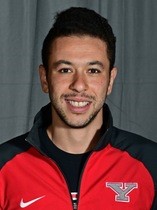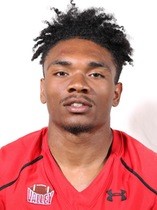YSU ‘disciplinary process is designed to be educational,’ spokesman said.

Youngstown State University in 2016 suspended a men’s tennis player it found responsible for sexual assault. Two years later, it installed him as an assistant coach of the men’s tennis team.
And one semester after that, the women’s tennis team.
Bassem El Mekawi was one of three Youngstown State athletes disciplined for sexually assaulting a female student in September 2015, records obtained by GateHouse Media show.
The case and the school’s subsequent hire of El Mekawi have not been made public until now. GateHouse Media obtained the information while researching the broader issue of NCAA athletes continuing their playing careers after being investigated and found responsible for sexual assault.

Youngstown State initially provided few details about the incidents beyond redacted records GateHouse Media was able to get after hiring attorneys to negotiate with the university located in Youngstown, Ohio.
But as GateHouse Media continued to uncover information about the case, the university became more cooperative, confirming details, answering questions and sharing new records.
In a statement, Youngstown State said it “takes the issue of sexual violence very seriously” and that its “disciplinary process is designed to be educational and not merely punitive.” El Mekawi graduated this year and is no longer affiliated with the school, the statement said.
“The university holds students accountable and enforces appropriate sanctions for their actions,” the statement said.
Youngstown State confirmed that its Title IX office received a complaint from the female student on Sept. 18, 2016, about two incidents occurring one year prior. Title IX refers to the federal law prohibiting sex and gender discrimination in education.
The student accused basketball player Sidney Umude of sexual assault on Sept. 5, 2015, at University Courtyard apartments, according to university spokesman Ron Cole, adding that the university classified it as a rape.
The second incident, classified by the university as fondling, occurred two weeks later on Sept. 19, and involved Umude, El Mekawi and football player Sidney Sandidge, Cole said. It also took place at University Courtyard, in El Mekawi’s apartment.
El Mekawi and Umude declined to comment for this story. Sandidge did not respond to at least four messages by phone and social media. The victim could not be identified from the redacted records.
The university placed the players on interim suspension two days after receiving the complaint, records show. After an investigation, administrators found all three athletes responsible for sexual assault by a preponderance of evidence, the same standard used in civil court, records show.
On Oct. 6 — less than three weeks after the victim filed the complaint — Youngstown State suspended Umude for 10 months, El Mekawi for seven months and Sandidge for two months, records show. It also banned Sandidge and Umude from campus residential facilities. And it ordered Sandidge to complete 20 hours of community service.
In addition, the university ordered all three to complete an online training module called “Think About It” to educate them about alcohol use, healthy relationships and consent, records show.
The university additionally found Umude responsible for theft and ordered him to pay $19 in restitution, records show.
Umude and El Mekawi unsuccessfully appealed the rulings, records show. The victim also appealed Umude’s sanction, which the university increased from a suspension to expulsion.
The campus police department did not investigate, school officials said, because the victim requested for the matter to be handled administratively. The university reported the incident to campus police solely as a matter of tracking crime statistics, its legal counsel said.
A copy of that police report obtained by GateHouse Media was almost entirely redacted. The university cited federal student privacy laws.
Umude transferred to Southern University in Louisiana, where he played two more seasons after Youngstown State expelled him over the incidents. Sandidge did not return to Youngstown State but later appeared on the roster of a semi-pro football team in Virginia.
El Mekawi
The case highlights the ease with which NCAA athletes who have been investigated and punished for sexual assault can continue their playing careers, and in El Mekawi’s case to join the ranks of college athletic staff.
Notorious for penalizing athletes who’ve smoked marijuana or accepted cash or gifts, the NCAA has no specific penalties for athletes found to have committed sexual assault and other violent offenses.
El Mekawi reapplied to Youngstown State after completing his suspension and Title IX training, said Cole. The university granted his application in the fall of 2017 and reinstated him to the tennis team for the 2017-18 season. He played 35 matches in his final year of NCAA eligibility, winning about half.
He became an unpaid assistant coach of the men’s tennis team in fall 2018 and the women’s team in spring 2019, Cole said. The women’s team head coach, Mickael Sopel, was El Mekawi’s head coach during his four years on the men’s team, the school’s website showed.
Youngstown State deleted all references to El Mekawi from the men’s and women’s tennis teams’ online rosters after GateHouse Media began asking questions.
El Mekawi also worked as a paid intern in the university’s athletics office during his final spring 2019 semester, Cole said. Officials know of no other incidents in which he was involved, Cole said in a statement.

Youngstown State is the same school that in 2016 recruited football player Ma’lik Richmond, one of two former Steubenville High School athletes convicted in 2013 of raping an intoxicated girl at a party. Richmond spent a year in juvenile detention and was listed on the juvenile sex offender registry until 2018.
Cole said the university has received no reports of misconduct involving Richmond.
“YSU is committed to the highest standards and best practices in supporting anyone affected by sexual misconduct or interpersonal violence,” Cole said. “We provide those affected with both university and community resources as well as appropriate accommodations. Creating a safe and secure campus environment for our students, employees and visitors is our top priority.”
But critics say the NCAA and its member universities fail to take seriously the risk to other students of allowing alleged sexual offenders on campus and elevating them to positions of prominence.
“What Youngstown State is doing is making the coach and his second chance the focus, rather than the risk to female students,” said Kathy Redmond, head of the National Coalition Against Violent Athletes. “The message is, if you sexually assault someone, we will still support your future endeavors at the risk of other students.
“It’s just sad, and to me, it sends the message that female athletes are expendable.”
Umude
After his expulsion, Umude transferred to Southern University, a Division I school in Louisiana, where he played his final two seasons of college basketball. He led the team with 384 points in 31 games as a senior.

Under NCAA rules, Division I athletes who transfer while suspended or disqualified for disciplinary reasons must sit out a year at their new schools before playing — the standard penalty for basketball players who transfer for lesser reasons. Umude sat out the 2016-17 season and returned for the next two seasons.
In an Oct. 10 statement, Southern spokeswoman Janene Tate said: “We have checked hard records and digital records, as well as talked to the former coach. At this juncture, we see no evidence that Southern was aware of Sidney Umude[’s] disciplinary action at his former university when he was admitted as a transfer student.”
Youngstown State disputed that, saying athletics officials did tell Southern. In addition, Cole said, Youngstown State completed a transfer-eligibility questionnaire, known as a “transfer tracer.”
Typically when an NCAA athlete transfers, the outgoing school fills out a tracer for the new school to review. Few NCAA schools conduct background checks on incoming transfers, instead relying in part on tracers to raise red flags.
The tracer Southern used at the time, which GateHouse Media obtained using public records laws, asks the question: “Has the student-athlete been subject to any disciplinary proceedings or sanction, or been penalized or dismissed from your institution for disciplinary reasons related to student conduct or NCAA compliance issues?”
Tate initially said Southern is “not in possession of” Umude’s tracer. But weeks later, Tate conceded that Southern did have a copy which, in fact, stated Umude was expelled from Youngstown State.
Umude is now listed on the roster of a professional basketball team in Denmark, the Svendborg Rabbits.
He wasn’t the only athlete Southern enrolled with previous misconduct allegations. Former Louisiana State University wide receiver Drake Davis enrolled earlier this year after a string of domestic violence and child pornography arrests while at LSU.
Although Drake is currently unaffiliated with the Southern football team, head coach Dawson Odums said that could change.
“We’ll see how it goes and evaluate it further in the spring,” Odums told The Advocate in October.
Sandidge
Sandidge, the third athlete involved in the Sept. 19, 2015, incident, did not return to Youngstown State after his suspension, Cole said. In the months following his departure, city of Youngstown police responded to three domestic disputes and arrested him at least once. He was not convicted, records show.

GateHouse Media is not naming the woman because she is the victim in a domestic violence case and was not arrested. She declined to comment.
In April 2017, the woman said Sandidge pushed her to the ground multiple times, prompting her to grab a kitchen knife in self defense, a police report shows. Sandidge told police she pushed him first and he pushed her off him. Police couldn’t determine a primary aggressor and did not make an arrest.
In June 2017, the same woman told police Sandidge kicked open the front door during an argument and began punching and dragging her around their apartment, a report shows. Police arrested Sandidge and booked him in jail, but prosecutors did not press charges, court officials said.
In July 2017, the woman told police Sandidge came to her apartment to fix a bed, which was broken during an altercation a few days earlier. While there, he became agitated and yanked their breastfeeding baby from her arms, she told police.
Sandidge then knocked away her phone, pulled her to the ground by her hair and punched her arms and head, she told police. Sandidge left with their baby, then gave the baby to their neighbor and ran away. The report does not indicate whether Sandidge was arrested.
Sandidge currently appears on the roster of a semi-pro football team, the Virginia Storm.